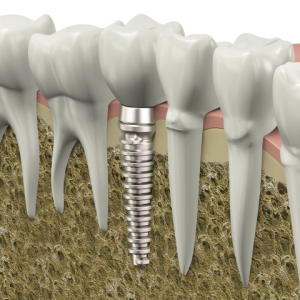25 Nov Lost Back Molar: Is a dental implant an option?
 Molars are vital to oral function. Since these teeth have flat and ample biting surfaces, they help chew food to small enough pieces so that we can swallow with ease. Just losing one molar can greatly affect oral function. Moreover, losing a molar can lead to additional tooth loss because neighboring teeth are left unsupported.
Molars are vital to oral function. Since these teeth have flat and ample biting surfaces, they help chew food to small enough pieces so that we can swallow with ease. Just losing one molar can greatly affect oral function. Moreover, losing a molar can lead to additional tooth loss because neighboring teeth are left unsupported.
These reasons are why it is so important to replace a lost tooth – especially a molar. The most lifelike option available today is dental implants, which make a great replacement for teeth at the back of the mouth. Placed by our oral surgeons, dental implants provide a sturdy base for prosthetics crowns and bridges.
What is a dental implant?
A dental implant is a metal post that resembles a screw. It has a ridged texture so that when it is embedded into the jawbone, it will stay firmly in place. Essentially, a dental implant replaces the root of a tooth.
What material is used to make dental implants?
Titanium is the metal used to make implants. This metal is fully biocompatible, which means that the jawbone will fuse to the implant and the body’s immune system will not respond negatively to its placement.
How long do dental implants last?
Successful implantation means that dental implants can last for decades and even for the rest of a patient’s life. What makes an implant so durable is the process of bone fusing to its titanium base, which is a biological progression called osseointegration.
What happens after bone stabilizes an implant?
Once the bone has integrated with the implant post, patients will receive their permanent prosthetic. For single tooth replacement, a custom-made crown is used. Crowns are tooth-shaped prosthetics that will replace the visible surface of a tooth. Different materials such as porcelain and metal alloys can be used to make a crown.
To learn more about your tooth replacement options, call our practice to schedule a consultation with one of our oral surgeons.
